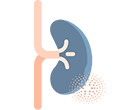Bergmann, C., Guay-Woodford, L. M., Harris, P. C., Horie, S., Peters, D., & Torres, V. E. (2018). Polycystic kidney disease. Nature reviews. Disease primers, 4(1), 50. https://doi.org/10.1038/s41572-018-0047-y
Ghata, J., & Cowley, B. D., Jr (2017). Polycystic Kidney Disease. Comprehensive Physiology, 7(3), 945–975. https://doi.org/10.1002/cphy.c160018
Wilson, P. (2004). Polycystic Kidney Disease. New England Journal Of Medicine, 350(2), 151-164. doi: 10.1056/nejmra022161
Ong, A., & Wheatley, D. (2003). Polycystic kidney disease—the ciliary connection. The Lancet, 361(9359), 774-776. doi: 10.1016/s0140-6736(03)12662-1
Rossetti, S., & Harris, P. (2007). Genotype–Phenotype Correlations in Autosomal Dominant and Autosomal Recessive Polycystic Kidney Disease: Figure 1. Journal Of The American Society Of Nephrology, 18(5), 1374-1380. doi: 10.1681/asn.2007010125
Xu, Y., Li, A., Wu, G., & Liang, C. (2017). Perspectives of Gene Therapies in Autosomal Dominant Polycystic Kidney Disease. Current gene therapy, 17(1), 43–49. https://doi.org/10.2174/1566523217666170510152808
Bergmann, C., Guay-Woodford, L., Harris, P., Horie, S., Peters, D., & Torres, V. (2018). Polycystic kidney disease. Nature Reviews Disease Primers, 4(1). doi: 10.1038/s41572-018-0047-y





